Why FIRE (Financial Independence, Retire Early) could burn you
9 min readWhy FIRE (Financial Independence, Retire Early) could burn you
<!–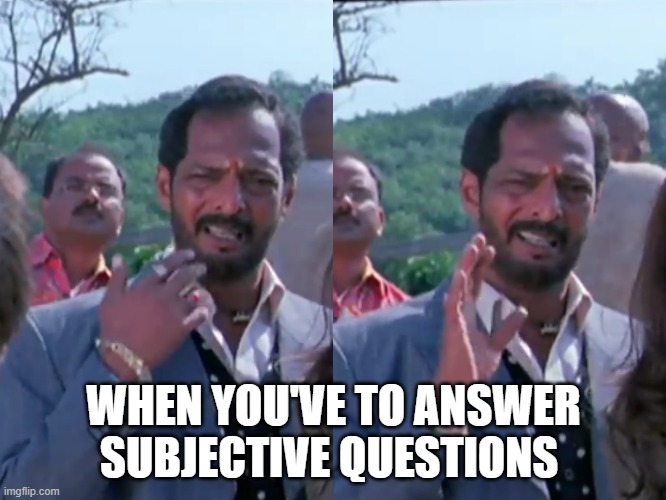
There are basics we all need to know… We can’t run before we walk – Four Ways of Thinking, David Sumpter.
In cinema, often dialogues with very little so-called literary merit, tend to do well, simply because they sound good to the ears and perhaps appear at the right moment in the movie. “Flower nahi, fire hai main (I am fire not a flower),” from the smash hit, Pushpa—The Rise, has been one such dialogue in recent years.
This one line, over the last couple of years, has kept the meme industry—for the lack of a better term—in India going. (Imagine what the meme wallahs could have possibly done with that legendary dialogue from the 2001 sleeper hit Style—hum hum hain, baaki sab paani kum hai (Please don’t expect me to translate this).
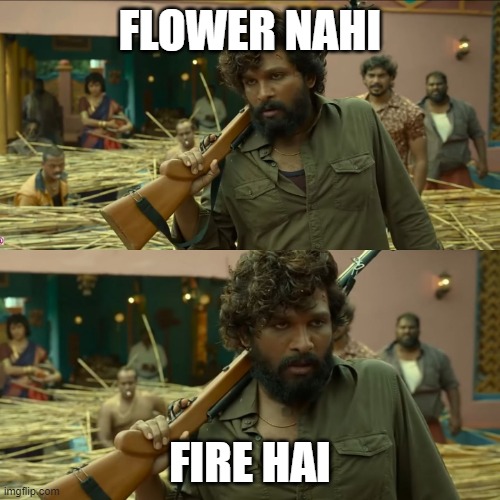
On the face of it “Flower nahi, fire hai main” is a very simple line, nonetheless, it has managed to capture mass imagination. Another fire, which seems to have captured mass imagination in an era of severe attention deficit is, Financial Independence Retire Early (FIRE).
Now, the term when it was coined originally, must have meant something deeper, but in this day and age, more often than not, it tends to signify how to make money quickly and retire early—at least, that’s how it’s portrayed by many financial influencers on the social media who keep selling this concept.
It’s like Martin Amis puts it in his 454 page rant, Money—A Suicide Note: “We’re going to make lots of money together. Making lots of money—it’s not that hard, you know. It’s overestimated. Making lots of money is a breeze. You watch.”
The trouble with any all-encompassing acronym is that it tends to make things simplistic and not simple, if you know what I mean. When it comes to money and how to spend and save it—even though there are all-encompassing truths at the aggregate macro level—there are unique situations at the individual micro level as well.
Dear reader, you may possibly not be in a position to save a lot of money every month and thus achieve financial independence and retire early. Now, that doesn’t always mean that you are handling your money in the wrong way. It’s just that, life has dealt you the hand that it has, and you need to make the best out of it. Basically, what I am trying to say here is that how much money you are able to save every month is a function of different variables, starting with the responsibilities and emotional attachments you have. Let’s look at a few examples.
<!–The broken window fallacy

1) You may be supporting your parents financially or taking care of the education costs of younger siblings. In this situation, you are bound to save less than you otherwise would have. And that’s that.
2) You may have chosen to buy a house at a young age (late 20s, early to mid 30s) simply because your parents wanted to live with you or you didn’t like to deal with a new landlord every few years or that you wanted your child/children to have a stable lifestyle, not having to create a new set of friends every time you move to a new house.
Again, these are all sensible decisions. But there is a trade-off and that is lower savings, given that what goes towards paying the EMI on the home loan, is an amount that cannot be saved and invested. (So, I think the entire debate on paying an EMI on a house you are living in, in comparison to investing through the SIP route is basically a stupid one. To each her own.)
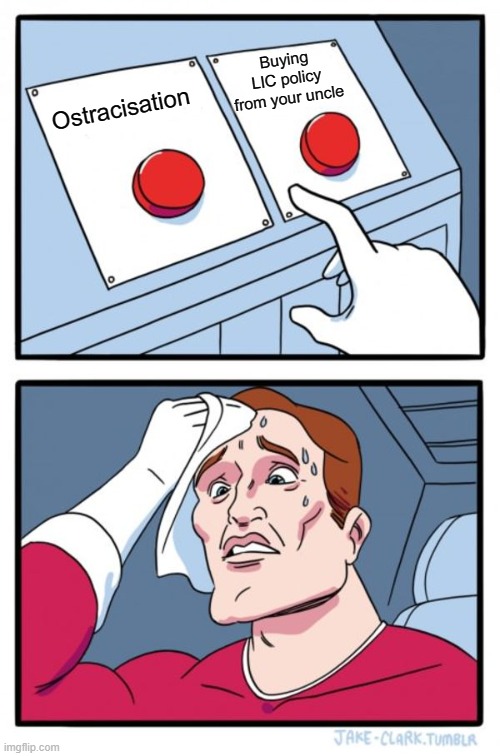
3) You may still be paying off your education loan.
4) Succumbing to societal pressures, you may have made a bad real estate decision, where the project you invested in has gotten stuck or the builder has disappeared. (I was in Delhi for a few weeks and every time I come to the city, I hear a few new real estate horror stories. It’s like people in other cities buy LIC policies from the neighbourhood uncles or relatives, people in Delhi buy homes, with practically zero due diligence, and then get stuck for years at end, and then spend more years trying to justify the stupid decision they made.)
Again, this is a decision which has consequences, simply because the bank will insist that you keep paying the EMI on the home loan you had taken to buy a flat in an under-construction project, even though there is no asset at the end of it.
5) This is a tricky point. The total amount of money you end up saving every month doesn’t just depend on the relationship you have with money, but the relationship your spouse has with money as well. While, you may understand the importance of savings, your spouse may not, simply because they want to keep up with the Sharmas.
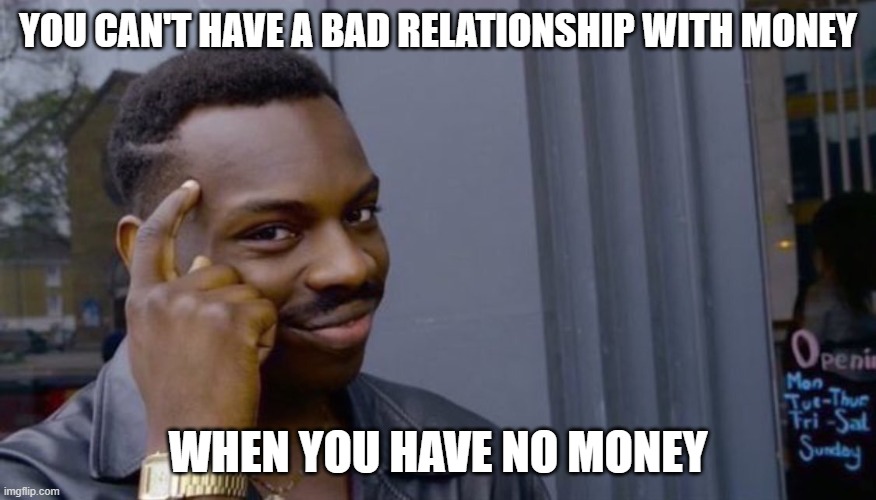
Again, a balance may not always be easy to maintain, simply because the relationship we have with money in most cases is formed during our younger years, and is not always easy to change. Given this, different people have different relationships with the money that they earn (or even do not earn).
So, there may be a cost involved here as well, given that the overall relationship with the spouse may be beautiful, with this one weak spot. The people around you may not look at the world in the same way as you do. So, the question is, when it comes to money, are you in a position to make the decisions you want to make.
<!–The larger point here is that everyone is not in a situation where they can save a lot of money every month, build a corpus and retire early. Let me take my case here. My parents are not financially dependent on me, neither is my sibling. Further, I don’t have to deal with a spouse’s relationship with money. Also, I don’t own a house. I rarely travel, given that travelling doesn’t give any meaning to my life. It’s just a hassle. I am not into gadgets and don’t need to buy a new iPhone every time one comes along. The only thing I have a weakness for is buying books, and how much money can you really spend on books? I mean, so many books can be bought at the cost of one iPhone.

In such a situation, I can save a substantial part of the money that I earn. And that gives me some flexibility to choose the work I take on. My savings basically give me the independence to live my life the way I want to. But then, that’s my goal with the money I earn and save; yours, dear reader, can be totally different.
So, in the zeal to retire early, it is important that one doesn’t take unnecessary financial risks in order to make a lot of money quickly, which quite a few people seem to be doing. Take the case of the huge boom in options trading that has been happening lately. As a recent Reuters news report points out: “The daily average value of assets underlying these stock options more than doubled between March and October to $4.2 trillion. The ratio of the notional value of derivatives to cash trading is the highest in the world.”
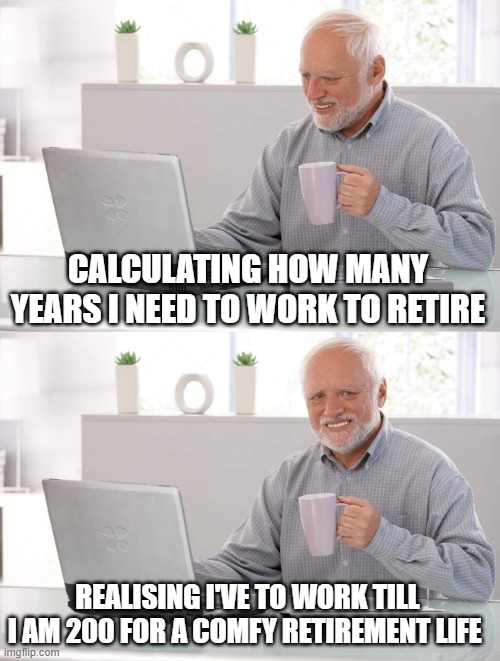
Some of this stems from a few finfluencers selling the FIRE principle to their followers. The trouble is that most retail investors eventually burn their hands trading derivatives. Or, take the case with the huge amount of money that has been chasing small-cap stocks during this year. The valuations of many of these stocks are totally out of whack, but that hasn’t stopped retail investors from punting in them because when the going is good, the going is good.
Now, making small gains by taking on increasing risk, is always a possibility, but the likelihood of making a lot of money by taking on such risks, is very low or virtually non-existent for that matter. Let’s take a simple example to understand this, considering an individual whose monthly expenses are around Rs 60,000 or around Rs 7.2 lakh a year. This individual wants to retire early. Dear reader, I am sure as an English-speaking reader of this newsletter, your expenses are probably more than this, but then, that will just prove the point I am trying to make even more.
What is the corpus required to generate an income of Rs 60,000 a month? At an interest of around 7% per year, it is a little over a crore (around Rs 1.03 crore to be exact). How many people have that level of savings in India? And this is without taking inflation into account. It also doesn’t take future expenses like the education and wedding of children, medical emergencies etc.
If your expenses are higher, you need an even bigger corpus. A monthly expense of Rs 1,20,000 will require a corpus of more than Rs 2 crore. The point here being that if you want to retire early, you need a lot of money saved up. Of course, the exact amount will vary depending on the circumstances of individuals and their families. Also, you are really not in a position to forecast future interest rates and inflation, which is why you probably need more money than what these basic calculations suggest.
Let’s say you are saving Rs 50,000 per month. This earns a return of around 10% per year, which I think is a reasonable assumption for a well-diversified portfolio. It will take around 10 years for the value of this portfolio to reach Rs 1 crore. In around 15 years, it will cross Rs 2 crore. Of course, Rs 2 crore, 15 years from now will be worth much lower than what is worth today.
<!–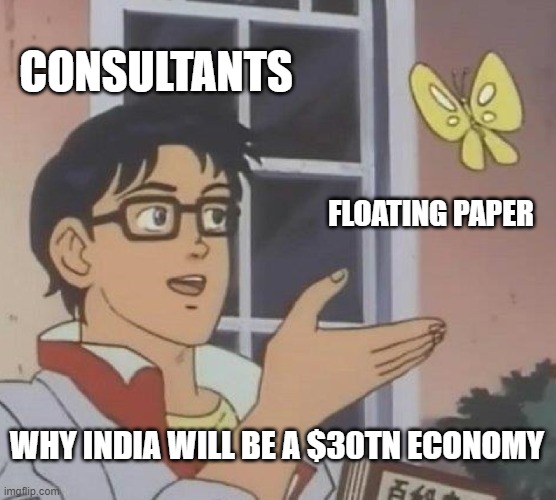
Now, if you save Rs 1 lakh a month, you will end up with a corpus of more than Rs 4 crore, 15 years down the line. Again, in inflation-adjusted terms, the purchasing power of Rs 4 crore will be much lower. If the inflation averages 5% per year, Rs 4 crore, 15 years down the line will have the same purchasing power as Rs 2 crore today (Of course, in very simple aggregate terms).
So, the point here is that if you want to retire early, you need to be saving a lot of money to start with, and that’s only possible if you are earning a lot of money to start with, or have inherited it, or have been in a position where your loss-making business gets funded by a VC who has access to all the easy money in the world.
<!–It’s the third kind of individuals, who are in the business of giving gyan on things like FIRE, without really taking their own situation or the situation of most people in general, into account. Or as the cliché I have often repeated in this newsletter goes, paisa kamane ke liye bhi paisa chahiye (you need money to earn money).
Given this, when you start saving money and how much money you are able to save every month, become very important. And that varies from person to person, depending on the hand that life has dealt them with and the attitude they have towards money.
The next point is that retiring early is really a luxury, which only a few can afford. Of course, there are people who are doing this and have gotten there because of their own efforts and some luck along the way, but they are largely exceptions to the rule.
<!–In fact, more than retiring early, it is important that one tries to find meaningful work, even if it pays a little lower. If that’s not possible, then one needs to figure out the level of nonsense that one is willing to put up with in the inevitable rat race that life has turned into.
As Morgan Housel writes in Same As Ever: “A unique skill, an underrated skill, is identifying the optimal amount of hassle and nonsense you should put up with to get ahead while getting along.”
And finally, as Mick Herron writes in The Secret Hours, about the times that we live in: “A Twitter following in the hundreds of thousands [is] a more certain indicator of expertise than, say, a career spent studying the topic at hand.” Dear reader, if that is how your learning on money is happening these days, well, then that will come with its own cost attached, sooner rather than later.
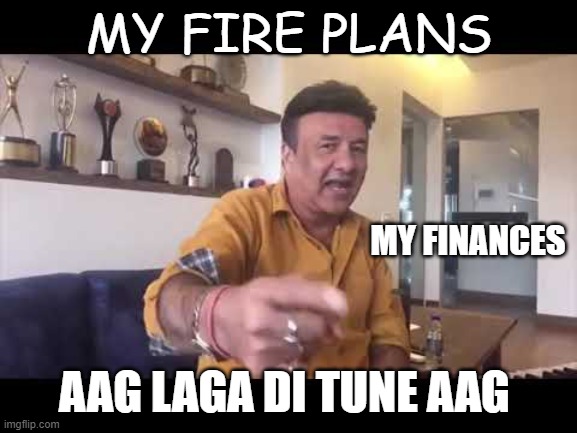
FIRE might lead to your finances catching fire. Just because someone is giving gyan on making money quickly, which you seem to understand well, doesn’t mean that it is going to happen that way. One of the few generic investing principles that hold well is that accumulating wealth takes time. In the end, it’s as simple as that. And, of course, the Twitter joke is on me as well.
<!–PS: Hindi film aficionados will of course know about Daag-The Fire.
Discover more from Slow Travel News
Subscribe to get the latest posts sent to your email.




